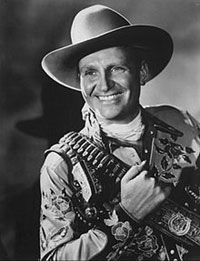
Orvon Grover Autry was born outside Tioga in Grayson County in 1907. His grandfather was a Methodist preacher, and his parents were ranchers. They would all have a profound impact on his outlook on life. The family moved several times, eventually ending up owning a ranch in southern Oklahoma.
He graduated high school in 1925 and took a job as a telegraph operator. He had an opportunity to play minor league baseball, but he declined and took up music instead. He often practiced guitar and singing while manning his telegraph station late at night, a move that eventually cost him his job. In 1928, he traveled to New York to audition for a record label. He failed. He returned to Oklahoma and picked up a job singing on a Tulsa radio station. By the next year, Columbia Records signed him to a contract.
Autry recorded 640 songs and wrote more than 300. Ultimately, more than 100 million copies of his albums were sold. He appeared in his first movie, In Old Santa Fe, in 1934. He would appear in more than ninety films, usually portraying a light-hearted singing cowboy. From 1936 to 1942, he was the top western actor in the country. Autry co-wrote "Back in the Saddle Again” with Ray Whitley in 1939. It immediately became a hit, and Autry performed it for the rest of his career. This followed with a popular radio program, Gene Autry’s Melody Ranch, which ran from 1940 to 1943 and from 1945 to 1956. He was nominated for an Academy Award in 1942 for Best Original Song for the 1941 melody “Ridin’ on a Rainbow” from the film of the same name.
In 1941, the small community of Berwyn, Oklahoma, renamed itself Gene Autry in honor of the star who had spent some of his formative years in nearby communities. Autry performed his radio show for the community at the dedication in appreciation for the honor.
Autry prided himself on his patriotism. In 1942, during World War II, and at the height of his fame, Autry decided he needed to do his part for his country at war. He enlisted in the U. S. Army Air Force, eventually becoming a C-109 transport pilot. He rose to the rank of tech sergeant and flew many difficult missions through the Himalayas to deliver supplies to allied Chinese troops fighting Japan.
As World War II came to a close, he began recording a string of his most iconic songs, popular decades later. In 1945, he released “Don’t Fence Me In” and released “Here Comes Santa Claus” in 1948. One of his most popular songs was his rendition of “Rudolph the Red-Nosed Reindeer.” Autry initially declined to record it, but his wife convinced him otherwise, believing that children would enjoy it. The song shot up to the top position on the charts for the 1949 Christmas season. His Christmas songs were so popular that they are inescapable part of the season even decades later.
In 1950, his radio show was adapted to TV as The Gene Autry Show, which ran until 1956 on CBS. After the early 1960s, he largely retired from performing to concentrate on his business interests. He owned several radio stations and bred horses for rodeos. In 1963, he bought Los Angeles television station KTLA for $12 million. He sold it for $245 million in 1982.
In 1961, he became owner of the Los Angeles Angels as Major League Baseball expanded to the West Coast. The team won the division three times but never won the World Series while Autry owned the team. “Win one for the cowboy!” became a popular rallying cry for Angels fans for years.
He released his autobiography, Back in the Saddle Again, in 1976. In honor of his stewardship of the Angels, Autry became vice-president of the American League starting in 1983. He founded the Gene Autry Western Heritage Museum in Los Angeles in 1988.
He died at his home in California in 1998 at age 91. His songs have been featured in nearly 200 movies and television shows, leaving a long legacy of music for fans around the world.

